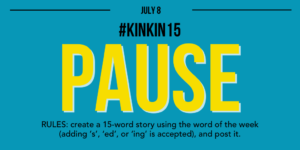Saturday evening in my Alpha Submissive Class for The Academy in Georgetown, SC, I brought up the Hierarchy of Needs as an illustrative point on the foundation of trust within a power exchange relationship.
I’ve received several follow-up messages about the idea from that class, which I began responding to this morning.
Looking at my writing calendar, I also found a link to this piece:
Needs vs Wants Hierarchy in a M/s relationship
That I’d added in to remind me to delve a bit deeper into the idea of what is a need and what is a want in a relationship.
What are needs?
To clarify, these are needs within a relationship, beyond the basic need to breathe, eat, have clean water, etc.
PolyHawker had included in his writing a couple of links to The Center for Nonviolent Communication (NVC) to a list of needs versus feelings that you might feel when your needs are being met.
Which are worth taking a look at.
I’d also like to share a simpler list that Anthony Robbins uses for the six human needs:
- Certainty
- Uncertainty
- Significance
- Love & Connection
- Growth
- Contribution
I’d like to point out the paradox of the needs of certainty and uncertainty, and how we need to feel both certain and secure in our lives, but without any uncertainty or challenge, we will feel stagnant, bored, and even at loose ends with no goals.
The tricky thing with this list and the other from the NVC is that how each person interprets these words and what makes us feel these needs are being met are different.
Take, for example, love and connection. I’ve mentioned a few dozen times the Five Love Languages, and for good reason. How I understand love versus how my partner understands it can be very different, and having clear examples makes showing love to others so much easier.
So, of course, communicating with your partner about how you experience these six needs, and being able to tie your individual needs to conversations matters.
For example, you could say, “I feel more certain about life when you involve me in household decisions,” or, “I value our vacations together, because to me, they are both growth experiences and time for love and connection.”
So, what, then, would be wants?
Well, truthfully, most wants will stem from our needs, so they can be hard to distinguish, sometimes.
When I want a hug, it is usually, in some small way, connected to my need for love and connection.
However, it is not a need AT THAT MOMENT, in that place. A line at Starbucks, for example, in the middle of the day.
I may be feeling a bit too certain of things right now, and experiencing a need to add spontaneity to my life, and I may want to do that in the middle of a boring business meeting, but my need is better served by thinking it through and choosing another time and way to fulfill that.
However, if wants are consistently left unfulfilled, it’s very likely that they are related to needs, and there will be issues in the long run.
So, how to handle conflicts of wants and needs?
There are three major challenges in handling wants and needs effectively.
- Honesty
- Gratefulness
- Prioritizing
Honesty
This is mostly honesty with yourself about what is a want and what is a need. Which, frankly, can be 90% of the challenge in being honest with others. It feels like it’s only about 10% of the effort to decide to lie or tell the truth, but getting to that truth to begin with takes far more.
Gratefulness
We are often ungrateful. Not with intent, but because of a thing called hedonic adaptation, which essentially says that no matter how awesome or amazing something is, we will soon get over it’s awesomeness, and return to a set point of happiness. Sort of like an internal thermostat of feelings. Taking time to review what is good and amazing about what we have (and how it addresses our needs) is critical to both honesty with ourselves and others, above, and prioritizing, below.
Prioritizing
One thing I’ve noticed about the Five Love Languages is that they shift over time in most people, often in response to what is going on in their lives and potentially missing right now. Which can be a great indicator of shifting priorities and which needs are being met and which are not. It’s a good idea to compare your current life to a list of needs (whichever you choose for yourself), and rate each on a scale of 1-10 (or whatever rating system you choose) for fulfillment in your life.
To give a few examples on prioritizing:
- Wanting to try EVERYTHING often results in never trying anything to satisfaction, as a couple or as an individual.
- Something that might seem like a want in a relationship, like small rituals or protocol can actually be tied intrinsically to a need (like significance) for someone.
- An agreement to a specific act might not be tied to a need, but breaking the agreement can affect a need deeply, because it’s the agreement that matters in that case, not the actual action.
- A want in the moment may directly conflict with a need. For example, a submissive being given something they want may in turn feel disappointed, because the fulfillment of said want crossed a need of theirs.
Understanding your priorities in needs getting met at any given time can give you a better idea of what you need to be focusing on and measuring in your life, to be more grateful and perhaps raise your “relationship satisfaction” setting on your internal thermostat.
And relying on a temperature reading from a few years or even several weeks ago may not be ideal, as your priorities shift.
How do we get our needs met?
Let me state for the record: I believe that YOU are solely responsible for getting your needs met.
I also believe that others can assist.
Which is where our partners come in.
This is why, in my needs hierarchy I say that a dominant’s top priority is their own needs and a submissive’s top priority is their own as well.
Which, on the surface, seems self-serving, possibly even full of conflict.
I believe differently.
I’ll write about that in another piece.
What do you think?
- On a sale of 1-10, how would you rank the six human needs in your life, with 1 being “not met at all,” and 10 being “need met perfectly”?
- Can you think of a time in the past when those numbers would have been different?
- What need is a priority for you right now?
- Do you have any ideas on how you might get that need met?
- Will it involve a partner, a lover, a friend, or maybe all of the above?
- How might you choose to approach others in your life about their needs?
- Would you want to put yourself in a position to help others achieve their needs goals and priorities?










2 Responses
i’m using this pretty much about wanting and needing a relationship because i’m not mentally or emotionally strong for a romantic whatever relationship nor am i confident enough about myself. i don’t want to fall back in into being codependent on others.
Good! You may also want to look at Covert Contracts Are Ruining Your Relationships!, as that specifically begins dismantling codependent habits.